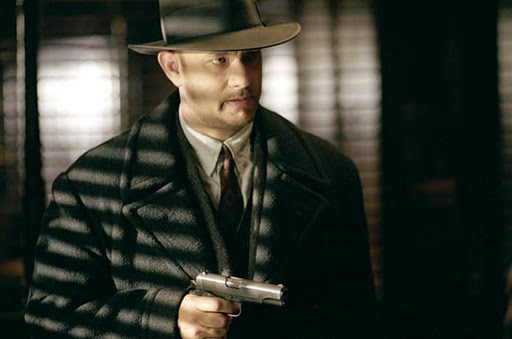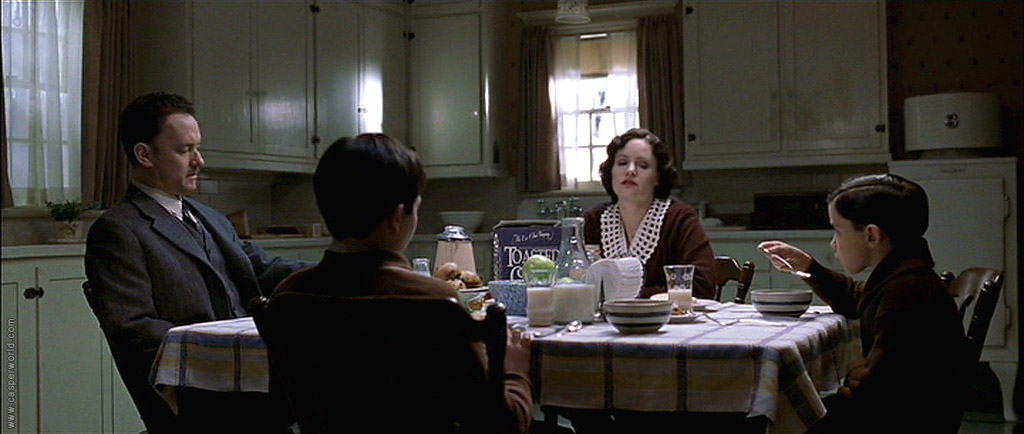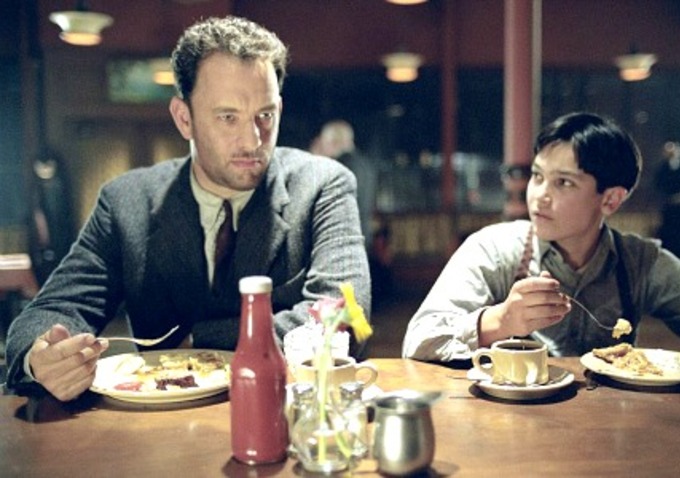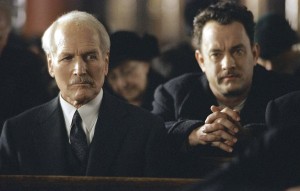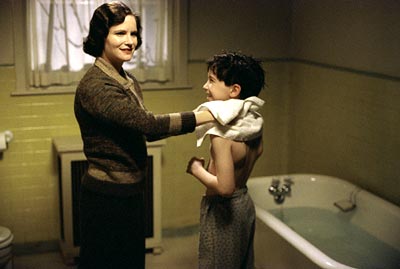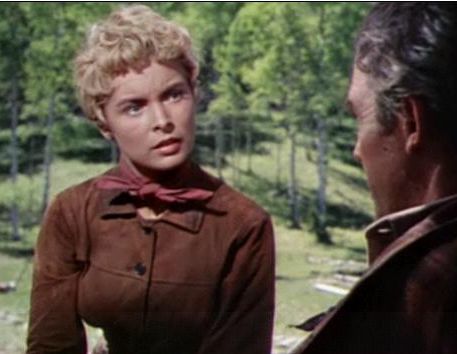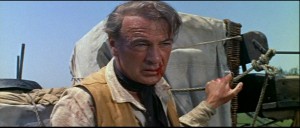From the Chicago Reader (July 12, 2002). — J.R.
Road to Perdition
** (Worth seeing)
Directed by Sam Mendes
Written by David Self
With Tom Hanks, Paul Newman, Tyler Hoechlin, Daniel Craig, Jude Law, Stanley Tucci, Jennifer Jason Leigh, Dylan Baker, and Liam Aiken.
It’s based on a graphic novel, which automatically precludes charges of arty pretension — something we all know is found only in literary works and foreign films, not Hollywood movies and comic books. It aims to do for Irish-American crime in the midwest what the Godfather trilogy did for Italian-American crime on the east coast (it uses Rembrandt lighting and fancy period decor, and it aims to be a grand metaphor for the American experience and family ties in general). It offers an array of primed-for-Oscars performances, two of them by former Oscar winners (Tom Hanks and Paul Newman). It recounts a classic tale of revenge, a classic coming-of-age story, and a classic account of bonding between fathers and sons. It dishes up gobs of carefully choreographed, deliberately excessive violence and bloodshed, and then, in the 11th hour, repudiates both — which calls to mind a touchstone like Bonnie and Clyde, as does its populist celebration of Good Country People.
In short, as a package calculated to garner just about every platitude, ring every bell, wave every flag, and squeeze out every dollar, Road to Perdition seems to have it made. It even has Sam Mendes — the highly capable English stage director who did American Beauty — and some adeptly used Chicago locations to boot.
Most, maybe even all of these attributes can constitute virtues if they’re handled with enough skill. And I won’t deny that they’re handled with a great deal of skill here; Mendes is as resourceful and inventive with these materials as he was with the equally salable goods of American Beauty — which I prefer in some ways, but only because I’m more of a sucker for the equally dubious New Age mysticism and middle-aged angst of that film than I am for redemptive bloodbaths and childish revenge stories, even if they’re also populated by middle-aged characters. I also tend to prefer stories in which women play more than a decorative part, and Road to Perdition has no such role. The built-in corruptions of the two movies are equally apparent — and equally irrelevant to those who opt for entertainment over virtue. So I can recommend them equally. And for those looking for directorial signatures, Mendes has found one: the symmetrically framed portrait of a small family seated at a dinner table.
“There are many stories about Michael Sullivan,” says Michael Sullivan Jr. (Tyler Hoechlin), the 12-year-old narrator, over a shot of a beach and the sound of lapping waves, in an opening so familiar we may feel we already know it by heart. “Some say he was a decent man. Some say he was no good at all.” I say the fact that he’s played by Tom Hanks makes him a decent man even if he sets out to slaughter enough people to fill a city block.
As soon as the boy adds that he and his father once spent some time together during the winter of 1931 we’re plunged into a nearly feature-length flashback about how a family man and hit man (Hanks) working for a gangster patriarch named John Rooney (Newman), who treats him like a surrogate son, loses two-thirds of his family (the symmetrical dinner-table portrait doesn’t last long) in a gangland killing precipitated by Michael Jr.’s having accidentally witnessed a killing by Rooney’s natural (and less favored) son Connor (Daniel Craig). The two Michaels flee, and Michael Sr. plots his revenge. As for Perdition, that’s a town in Illinois where the sister of Michael Jr.’s slain mother lives.
Classy and crass at the same time, this well-acted, superbly mounted story reeks of significance at every turn, as signaled not only by a town called Perdition but by a hit man named Maguire (Jude Law) who trails the two Michaels and who doubles as a press photographer specializing in corpses. (He “shoots” them–get it?) But even though this highfalutin, self-consciously mythic narrative abounds in cliches, Mendes makes many of them seem newly minted, and some of the moves in David Self’s screenplay are comparably original.
A montage sequence of father and son pulling off small-town bank robberies is a good case in point. Small-town bank-robbery montages are as old as the Hollywood Hills, but here the robberies are predicated on a relatively novel premise (hitting the off-the-books bank accounts of Al Capone), and the heists are pulled off by a father-and-son team — with a 12-year-old driving the getaway car. Mendes gives these materials a neat stylistic spin by chronicling the robberies as a series of left-to-right camera movements past bank and street, theft and getaway, all glued together as if they were a single continuous tracking shot.
I like Mendes’s talent for invention, even when it calls attention to itself (as in the robbery montage or when he shuts off the sound of gunfire during most of a climactic shootout), and I like his capacity to view American life from an outsider’s perspective. I don’t like his paradoxical capacity to use this outsider’s perspective to validate many of this country’s most complacent notions about itself; his international credentials let him pretend to be critical of American attitudes while swallowing them hook, line, and sinker. This attitude made American Beauty a piece of kiddie porn and an attack on middle-aged women almost as much as it was a serious look at male menopause and middle-age burnout. And it makes Road to Perdition a movie that exploits infantile notions about vengeance, even though it’s careful to tack on a moral disclaimer at the end.
This is where I have trouble with the popularity of revenge plots as a distillation of American values. My problem isn’t so much the dramatic validity of such plots — which, after all, can be found in abundance in Greek and Elizabethan tragedies and 19th-century novels as well as in Italian and American westerns, Charles Bronson thrillers, and most contemporary action movies. Rather it’s the sanctioning of some of the most childish notions about proper adult behavior, including ill-conceived notions of tit for tat, in which the similarity of the words seems to suggest an equivalence in some strange scheme of universal justice. The sanctioning of such ideas has real consequences, reinforcing, for instance, the idea that the recent invasion of Afghanistan was an appropriate response to terrorist attacks on New York and Washington, even though the attackers were dead, most of their sponsors weren’t caught, and many innocent Afghans’ lives (the current estimate is more than 3,000) have been lost. So far the Afghans’ losses haven’t seemed worthy of much discussion — certainly not worthy of any revenge on their part. (People who argue that Afghanistan hosted terrorists might just as well argue that this country has supported them too: for example, Reagan enthusiastically endorsed Osama bin Laden.)
I don’t mean to suggest by any of this that Road to Perdition endorses or even tolerates “collateral damage.” Here the collateral damage — the killing of Michael Sr.’s wife (Jennifer Jason Leigh) and one of his sons — is the act that sets the revenge plot in motion, and other forms of collateral damage and revenge lead up to this offscreen event. What bothers me is the compulsive reliance on revenge in movies, not only as a dramatic staple but as an embodiment of this country’s sense of ethics. It’s seldom examined in detail; instead it’s usually glamorized, with the avenger most often seen (as he is in Road to Perdition) as a model of grim stoicism, driven by some sense of a higher purpose, not simply getting his rocks off. Vengeance is a notion that tastes sweet mainly to the powerless, which often means members of minorities, including the Irish in this story–and that makes it a fantasy of compensation, much as PC language seems most vital to people without the power to change their lives in other respects. As a result, revenge plots have a surefire commercial appeal almost everywhere, which is why commercial filmmakers rely on them. But the moment they go beyond a simple desire to entertain and profess to teach us some form of wisdom is the moment I start to gag.
A good counterexample is provided by the two Anthony Mann westerns I wrote about last week. Both incorporate some notion of an avenging hero resorting to violence, though not at all stoically, and both heroes’ loss of emotional control shows their vulnerability, not their power. James Stewart actually bursts into tears in the final scene of The Naked Spur (1953), and Gary Cooper in Man of the West (1958) comes close to doing the same when he punishes an outlaw who forced Julie London at knifepoint to strip by tearing off the man’s clothes. In both cases the impulse toward revenge is clearly and honestly marked as a form of regression toward childhood or more recent traumas, not as any sort of catharsis or adult achievement of justice. Perhaps if Sam Mendes looks for scripts worthy of Anthony Mann, we may get something better than double standards and Oscar bait.

